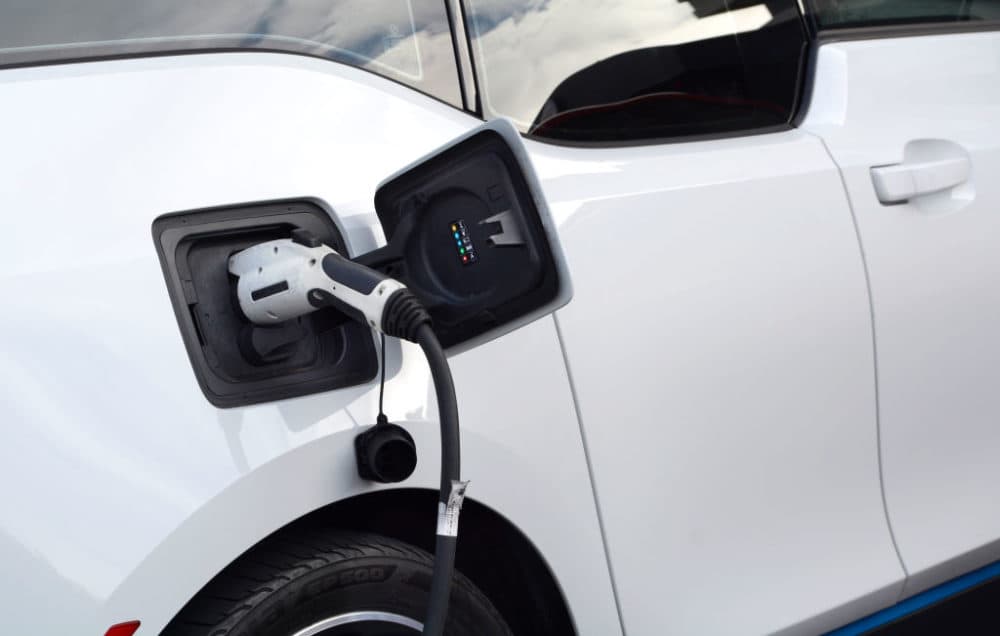Advertisement
Preparing for America's electric vehicle future
Resume
Sign up for the On Point newsletter here.
The EPA announced new emissions standards last week which should dramatically speed up the race toward electric vehicles.
Going electric will help mitigate climate change, but it will require millions of new electric vehicles which means lots of new batteries.
China has a stranglehold on battery production and the mineral supply chain — and catching up won’t be easy or quick.
"This decade is very much China's decade," Steve Levine says. "And what we're trying to do, what the US is trying to do is to capture some space so that we're in the game in 2030."
Today, On Point: From mining to geopolitics, ramping up America’s EV future.
Guests
Steve Levine, editor of The Electric, an online publication from tech media company The Information. He writes about EV batteries and electric vehicles. Author of The Powerhouse: America, China, and the Great Battery War.
Alissa Kendall, professor in the department of civil and environmental engineering at UC Davis.
Also Featured
Gary McKinny, spokesperson for The People of Red Mountain, a group of tribal descendants from the Fort McDermitt Paiute Shoshone tribe who oppose the Lithium mining project at Thacker Pass in Nevada.
Interview Highlights
On the rise of EV vehicles in the U.S.
Steve Levine: "The first problem, let's say that everyone in the United States who wants to buy a car, an EV, in 2032 goes out to try to buy one. There is not enough batteries. The critical minerals that go into batteries, mainly lithium and nickel. There is not projected enough of those two metals to make that many batteries. And that's the first thing. And the second thing is the one thing that we've left out of the whole discussion about EVs is the consumer. There is not evidence that two thirds of American car buyers want an EV."
On achieving the Biden administration's EV goals
Steve Levine: "The goal is to carry out this transition, but to do it without China. So the fact that China controls the commanding heights of batteries, China doesn't control the actual minerals. They come from all over the world. They have some of the minerals. But they've tied up a lot of the minerals. But what they do is their strength, the Chinese strength is that they control the center, the midstream, the processing of all of those minerals all along the value chain until you get the electrodes that go into the batteries. It means that China by itself is like all of OPEC, except for batteries. And at any moment, remember, China is the United States' greatest technological rival. And at any moment it could say in whatever language, we're going to supply our own EV industry and we're not going to supply yours."
On the multi-billion-dollar investment in EV's
Steve Levine: "The U.S. is starting essentially from scratch. The down payment that the administration, Congress. ... Remember, Senator Manchin was the one who came up with the Inflation Reduction Act, has come up with, is big. There is no peacetime equivalent in industrial policy. There's no analogy to the IRA. And remember, there are three pieces to it. So there's the infrastructure bill, that's very big, that has a lot of money for both batteries and charging stations.
"There's a gigantic loans program, $250 billion. And then on top of that, there's the Inflation Reduction Act. So all of those together are hundreds of billions of dollars. It's real money and it's a serious program and everything is in the execution. Private industry needs to come in and invest much more than that. But it is a very impressive start."
On environmental concerns
Alissa Kendall: "Here in California, where I'm sitting, we have a really low carbon electricity grid, relative to a lot of other parts of the U.S. So of the miles you're going to drive, the more you can do electric, the better. So in a place with a reasonably low carbon electricity grid, you know, buying an electric car sooner than later can, you know, really result in deep reductions in greenhouse gas emissions.
"On the other hand, I think Steve's point is well placed that as we see more and more models available on the road, you're more likely to find a vehicle that meets your criteria, whether that's a criteria on price or different kinds of characteristics of the vehicle. And maybe it's always a good time to buy a used electric vehicle if you're fortunate enough to find one. They're hard to find around here.
"And I have a really aged plug-in hybrid electric vehicle. I think that's the technology that Steve is talking about, where you have a battery that can take you quite a few miles, all electric and then an engine that turns on. And those can be good choices as well, although in the long run, those will be more expensive because you have a whole engine powertrain and a whole electric powertrain. Although because batteries have been so expensive, that hasn't been true in the past. So I think in the future that might flip to the all-electric vehicles being less expensive for consumers.
On America's EV future
Alissa Kendall: "I think I remain optimistic that we're going to make real inroads to seeing more and more electric vehicles on the road and that these vehicles are going to be attractive to future consumers for sure. My real focus right now is thinking about the mid-life of electric vehicles. You know, we've been focusing on pushing out new vehicles. We haven't really thought about all the transition that needs to happen in the repair network and used vehicle sales and ensuring that consumers of used vehicles have, you know, excellent reliability and the ability to repair at low cost. So that's where I'm looking. I'm looking at these aging vehicles and making sure that they remain useful and safe for everyone."
Related Reading
The Information: "The Electric: Beware the Pitfalls of a Subsidized EV and Battery Industry" — "For years, U.S. economists, politicians and pundits have denigrated China’s battery and electric vehicle industries, suggesting that because the government has subsidized them, they are somehow mere inventions and not real."
This program aired on April 18, 2023.

